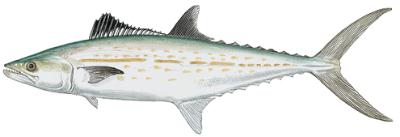A popular gamefish in tropical waters and a member of the Scombridae family, the cero mackerel is a pelagic species that also has commercial interest. It is considered excellent table fare and is marketed fresh, smoked, and frozen. Off-shore anglers may use the cero mackerel as rigged bait for larger predatory species.
Identification
The cero mackerel is iridescent bluish-green above and silvery below, with rows of short, yellow-brown spots above; there are also yellow-orange streaks and a dark stripe below, which runs the length of the body from the pectoral fin to the base of the tail. The front of the first dorsal fin is bluish-black and has 17 to 18 spines and 15 to 18 gill rakers on the first arch. The pectoral fins are covered with small scales. The cero mackerel differs from the king mackerel and the Spanish mackerel in the pattern of its spots, which are rather elongated and arranged in lines instead of being scattered; the cero mackerel also has a lateral line that curves evenly down to the base of the tail, which further distinguishes it.Size
The all-tackle world-record cero mackerel weighed 17 pounds, 2 ounces. This species usually weighs less than 5 pounds. |
 |
